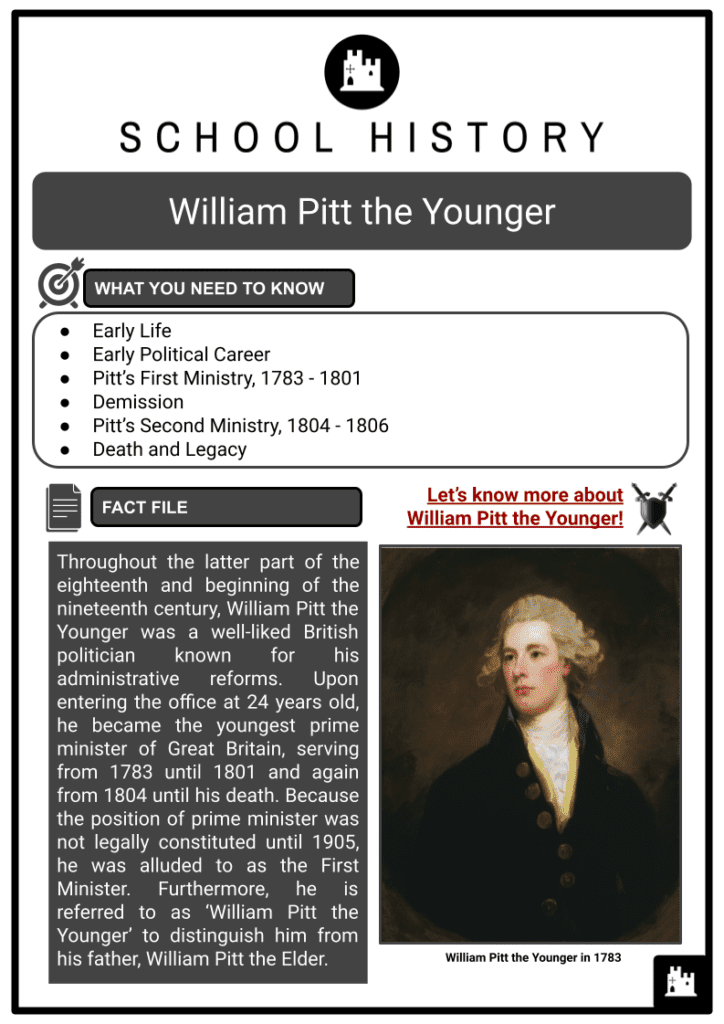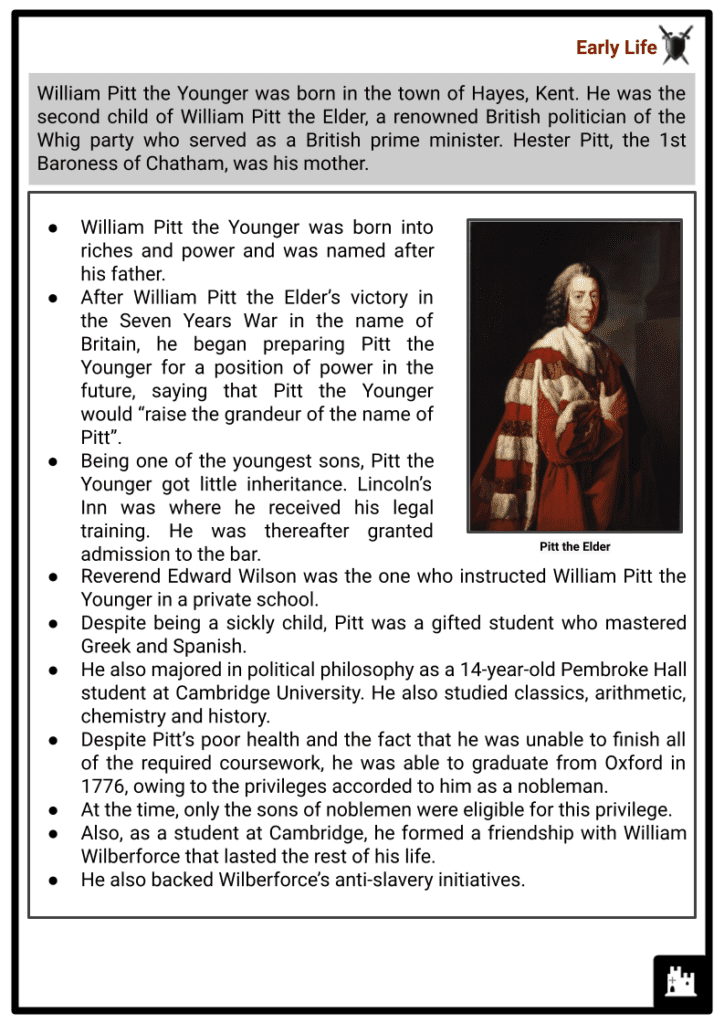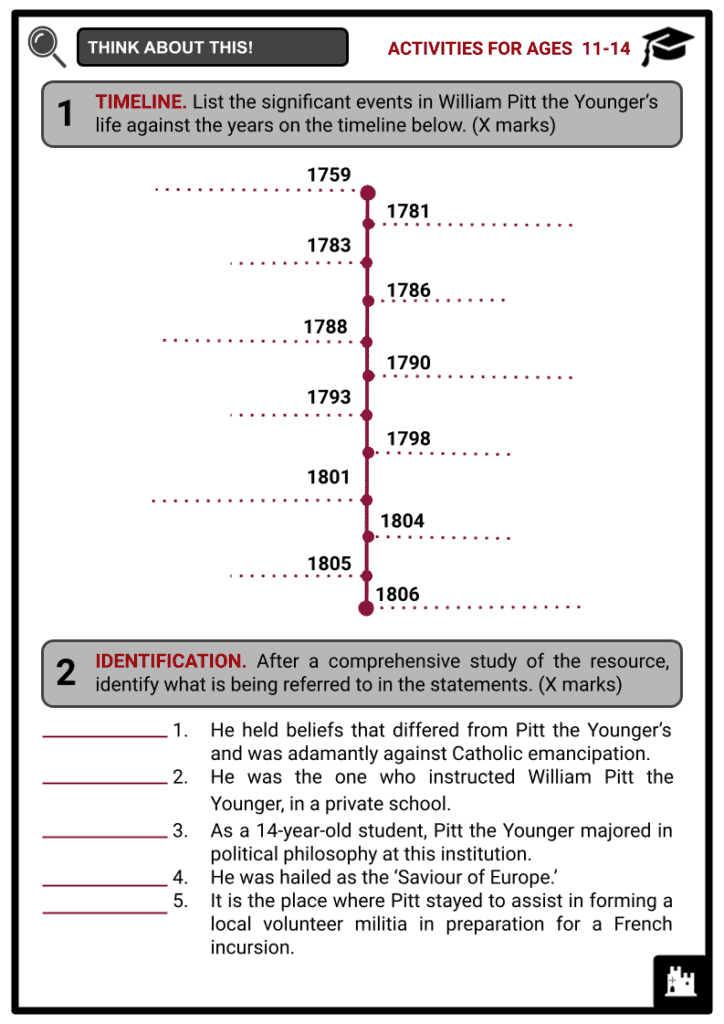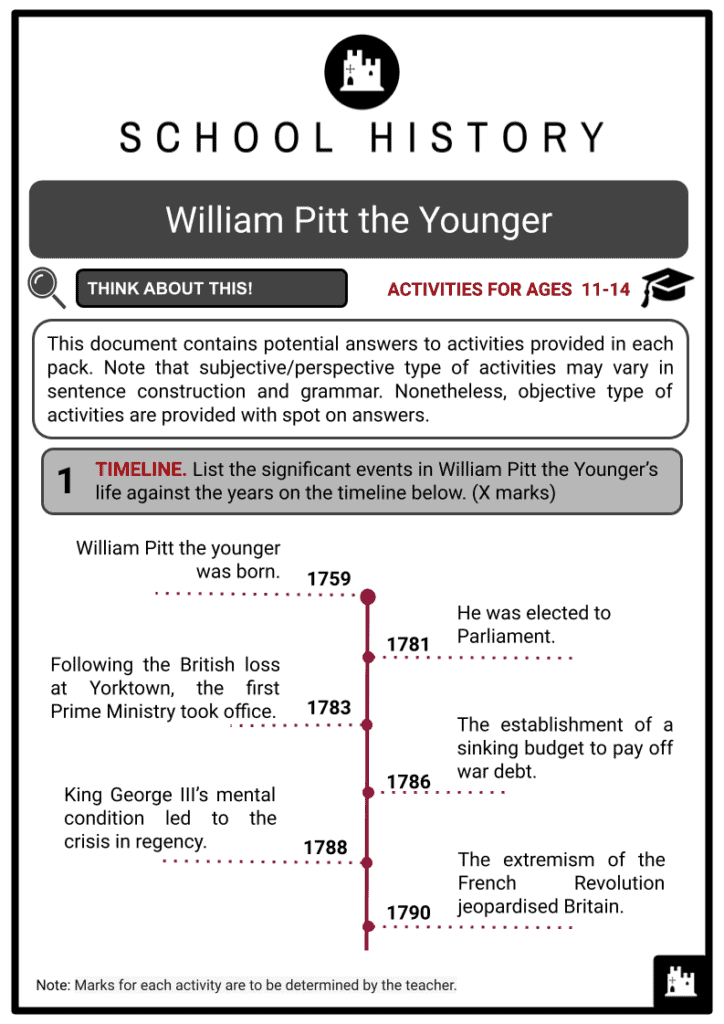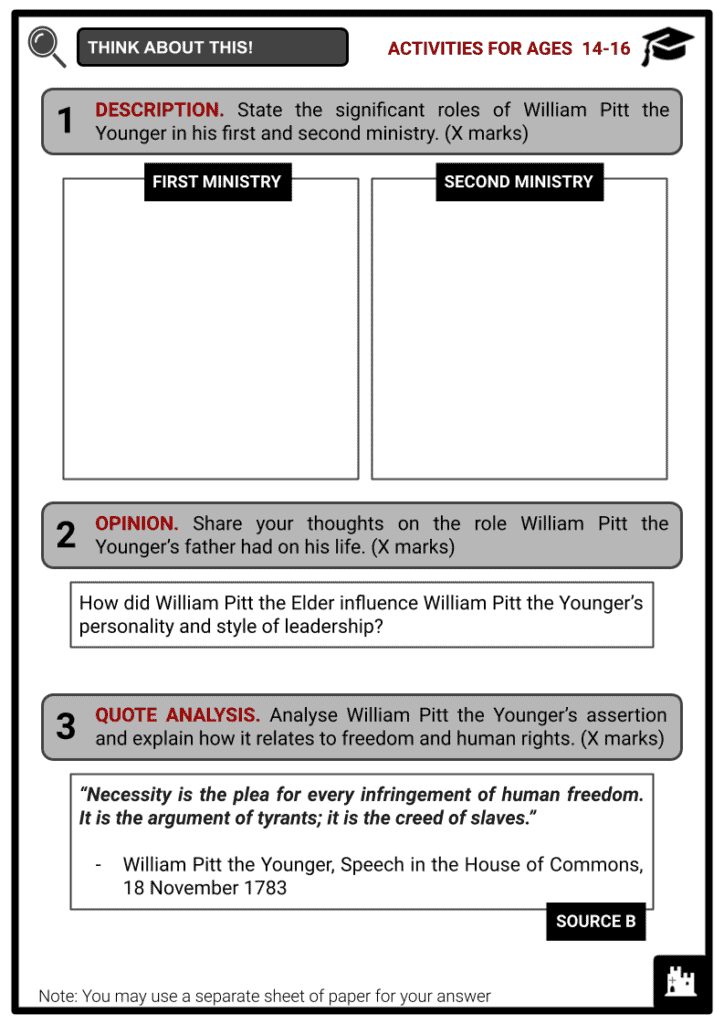William Pitt the Younger Worksheets
Do you want to save dozens of hours in time? Get your evenings and weekends back? Be able to teach about William Pitt the Younger to your students?
Our worksheet bundle includes a fact file and printable worksheets and student activities. Perfect for both the classroom and homeschooling!
Summary
- Early Life
- Early Political Career
- Pitt’s First Ministry, 1783 - 1801
- Demission
- Pitt’s Second Ministry, 1804 - 1806
- Death and Legacy
Key Facts And Information
Let’s find out more about William Pitt the Younger!
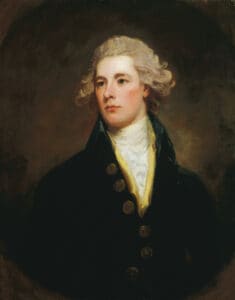
Throughout the latter part of the eighteenth and beginning of the nineteenth century, William Pitt the Younger was a well-liked British politician known for his administrative reforms. Upon entering the office at 24 years old, he became the youngest prime minister of Great Britain, serving from 1783 until 1801 and again from 1804 until his death. Because the position of prime minister was not legally constituted until 1905, he was alluded to as the First Minister. Furthermore, he is referred to as ‘William Pitt the Younger’ to distinguish him from his father, William Pitt the Elder.
Early Life
- William Pitt the Younger was born in the town of Hayes, Kent. He was the second child of William Pitt the Elder, a renowned British politician of the Whig party who served as a British prime minister. Hester Pitt, the 1st Baroness of Chatham, was his mother.
- William Pitt the Younger was born into riches and power and was named after his father.
- After William Pitt the Elder’s victory in the Seven Years War in the name of Britain, he began preparing Pitt the Younger for a position of power in the future, saying that Pitt the Younger would “raise the grandeur of the name of Pitt”.
- Being one of the youngest sons, Pitt the Younger got little inheritance. Lincoln’s Inn was where he received his legal training. He was thereafter granted admission to the bar.
- Reverend Edward Wilson was the one who instructed William Pitt the Younger in a private school.
- Despite being a sickly child, Pitt was a gifted student who mastered Greek and Spanish.
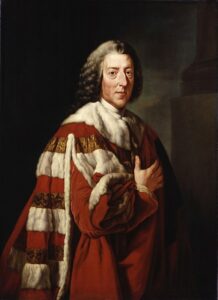
Pitt the Elder - He also majored in political philosophy as a 14-year-old Pembroke Hall student at Cambridge University. He also studied classics, arithmetic, chemistry and history.
- Despite Pitt’s poor health and the fact that he was unable to finish all of the required coursework, he was able to graduate from Oxford in 1776, owing to the privileges accorded to him as a nobleman.
- At the time, only the sons of noblemen were eligible for this privilege.
- Also, as a student at Cambridge, he formed a friendship with William Wilberforce that lasted the rest of his life.
- He also backed Wilberforce’s anti-slavery initiatives.
Early Political Career
- Pitt ran for the seat of the University of Cambridge in the general elections of September 1780 but was unsuccessful. Despite this, most reformers at in Parliament at this time regarded him as their leader rather than his predecessor, Charles James Fox.
- With the assistance of his colleague Charles Manners, the 4th Duke of Rutland, Pitt, who was still determined to become a member of parliament, gained James Lowther’s support. Pitt was elected to the House of Commons in a by-election in the corrupt borough of Appleby, which Lowther largely controlled, in January 1781. Pitt’s election to Parliament is ironic in that he afterwards organised a protest against the same corrupt boroughs that gave him the position.
- As a young man, Pitt put aside his reserved and distant demeanour in Parliament and became known as a skilled debater and parliamentarian. In the beginning, he supported notable Whigs like Charles James Fox. Also, Pitt opposed the ongoing American War of Independence with the Whigs. Instead, he suggested that Lord North, the prime minister, must make peace with the disobedient American colonies. He also backed efforts to change the law, like the one that would have stopped election fraud.
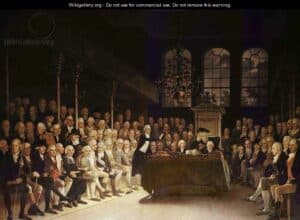
William Pitt addressing the House of Commons on the French Declaration of Wars 1793 - As a result of Fox’s opposition to Shelburne and Pitt’s loyalty to the prime minister, their political duel ended Shelburne’s ministry. Fox defeated Shelburne by allying with Lord North. Together they were victorious. So, when he was removed from his job as Chancellor following Shelburne’s downfall, Pitt joined the faction that was against the current government.
- He brought up the subject of legislative reform to put pressure on the shaky Fox-North Coalition, which consisted of individuals who were both proponents and opponents of reform.
- He did not argue for an increase in the number of people who could vote, but he did try to address issues of bribery and corrupt boroughs, even though he represented one himself. Although his plan was unsuccessful, many reformers in Parliament came to view him as their leader rather than Charles James Fox.
Pitt’s First Ministry, 1783 - 1801
- When reconvened in January 1784, the parliament was defeated by 39 votes on a virtual motion of censure. However, Pitt refused to quit and agreed that his position was unprecedented. He disputed that he became Prime Minister by backdoor means. Nonetheless, he made many significant changes in his first ministry.
- As Pitt clung on, the coalition’s majority rapidly dwindled. Many members, scared of losing their seats in a general election, switched to Pitt’s side to achieve a majority in the current parliament and avoid dissolution.
- On the 8th of March, the opposition against him had a one-vote majority. Eventually, the parliament was dissolved on the 25th. Through corruption and patronage, Pitt gained the majority vote. Additionally, secret service funds were used to pay for his election expenses.
- It is inaccurate to claim that Pitt was ‘the choice of the people’, even if popular opinion supported him in the open constituencies. In essence, he was the one who gave out royal patronage. Eventually, Pitt was sent back to Cambridge University and only had to run for office again in 1790 and in subsequent elections.
- The American Revolution harmed the nation’s credit when Pitt became prime minister. He raised taxes to eliminate the deficit, cut smuggling-encouraging duties, and strengthened revenue audits to minimise fraud. Additionally, Pitt integrated customs and excise charges into a single pool from which public creditors were paid. He also introduced a sinking fund in 1786.
- In 1784, Pitt introduced the East India Bill. Also, he formed the Board of Control to oversee the company’s directors. He fixed the power division between India by giving Bombay and Madras to the governor-general.
Demission
- William Pitt the Younger attempted to establish the new kingdom by reaching an agreement with Roman Catholics, who constituted the majority in Ireland, by lifting the political constraints they faced. But because he had different views from the king and failed to change his beliefs, he resigned on 16 February 1801.
- George III was adamantly opposed to Catholic Emancipation, claiming that granting more liberty would violate his coronation oath, in which he swore to defend the established Church of England. Nonetheless, Pitt’s demission allowed his political ally Henry Addington to create a new ministry.
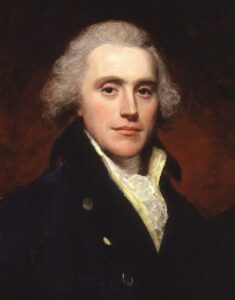
Henry Addington as portrayed by William Beechey - But Addington did not immediately attain his formal appointment because, coincidently, George III was again of unsound mind. Despite what preceded, Pitt temporarily continued to do his duties to the extent that on 18 February 1801 he even presented the yearly funds. Eventually, Pitt passed the power to Addington following the recovery of the king on 14th of March.
- Despite his support for the new regime, Pitt often skipped parliament, preferring to stay at his Lord Warden’s abode of Walmer Castle and assist in forming a local volunteer militia in preparation for a French incursion.
- Following a string of British military triumphs, the French agreed to a treaty of peace in the Treaty of Amiens (1802). However, by 1803, the fighting had resumed.
- Despite Addington’s invitation to join the cabinet, Pitt chose to join the opposition, becoming more critical of the government’s policies.
- Addington’s majority rapidly dwindled as he was unable to overcome the united opposition of Pitt and Charles James Fox. By May 1804, Addington had chosen to retire after losing parliamentary support.
Pitt’s Second Ministry, 1804 - 1806
- In 1804, William Pitt the Younger returned to prime ministership as the country anticipated an incursion by Napoleon that did not unfold. Returning to the ministry, his administration became less effective due to the lack of support from his previous allies and followers. Furthermore, the country faced a series of battles that significantly affected his health.
- On 10 May 1804, Pitt reclaimed the premiership. He had intended to build a broad coalition administration, but George III objected to the inclusion of Fox.
- Pitt’s second ministry was far weaker than his first because many of his previous supporters, particularly the followers of Henry Addington, joined the opposition.
- French Emperor Napoleon I was subjected by the British government to persistent pressure. Nonetheless, Pitt the Younger’s efforts paved the way for Britain to unify with the Third Coalition, an association he engineered that involved Sweden, Russia and Austria.
- Horatio Nelson, 1st Viscount Nelson, the British admiral at that time, brought the country to a strenuous victory in the Battle of Trafalgar in October 1805, assuring British naval superiority for the duration of the war. But after suffering heavy setbacks at the Battle of Ulm in October 1805 and fighting Napoleon I in the Battle of Austerlitz in December 1805, the coalition was utterly vanquished.
Did You Know?
Pitt the Younger uttered his most famous powerful phrase during the yearly banquet of the Lord Mayor, where the people recognised him as the saviour of their country. Pitt remarked:
“I return you many thanks for the honour you have done me; but Europe is not to be saved by any single man. England has saved herself by her exertions, and will, as I trust, save Europe by her example.” (The War Speeches of William Pitt, Oxford University Press, 1915, p. 351)
Death and Legacy
- His declining health due to heavy drinking, the setbacks throughout the war, and the weak constitution, hastened his death. But despite dying at a young age, he made significant contributions to Britain.
- Due to the defeat of Britain’s forces at Austerlitz in 1805, Pitt’s health deteriorated, and his port penchant further exacerbated his suffering. Subsequently, Pitt the Younger, at the age of 45, having no wife and children, died of liver disease on 23 January 1806.
- On behalf of Pitt, Parliament decided to pay the £40,000 debt he left. Furthermore, they approved the proposal of honouring him with a public burial and a monument despite Fox’s resistance.
- Pitt’s corpse was interred at Westminster Abbey on the 22nd of February, after lying in state in the Palace of Westminster for two days. William Wyndham Grenville, 1st Baron Grenville, Pitt’s first cousin, replaced him as Prime Minister and led a cabinet that included Charles James Fox.
- His Constitutional Act (1791) established Lower Canada’s institutions and the division of Canada into Upper and Lower Canada. Despite the king experiencing mental illness momentarily, Pitt the Younger maintained his power and prevented Fox from facilitating an enduring administration.
- Despite his failure to pass resolutions regarding Catholic emancipation, bills concerning the quelling of the slave trade, and legislation reforms, William Pitt the Younger still had momentous accomplishments.
- Aside from restoring the country’s finances following the American Revolution, Pitt assisted the government in managing the growing national debt by cutting the country’s spending, enacting additional taxes, lowering customs fees, and making modifications to the tax system, further increasing its efficiency. He also gradually abolished sinecures or individuals who earned and received payment despite doing nothing and then used their profits to buy political support. Apart from providing long-term compensations to people who lost their sinecures, Pitt also waited for them to die before abolishing the post.
Image Sources
- https://upload.wikimedia.org/wikipedia/commons/d/de/George-Romney-xx-William-Pitt-the-Younger-xx-Tate-Britain.jpg
- https://en.wikipedia.org/wiki/William_Pitt,_1st_Earl_of_Chatham
- https://www.wikigallery.org/wiki/painting_209507/Anton-Hickel/William-Pitt-addressing-the-House-of-Commons-on-the-French-Declaration-of-Wars-1793
- https://en.wikipedia.org/wiki/Henry_Addington#/media/File:Henry_Addington_by_Beechey.jpg

